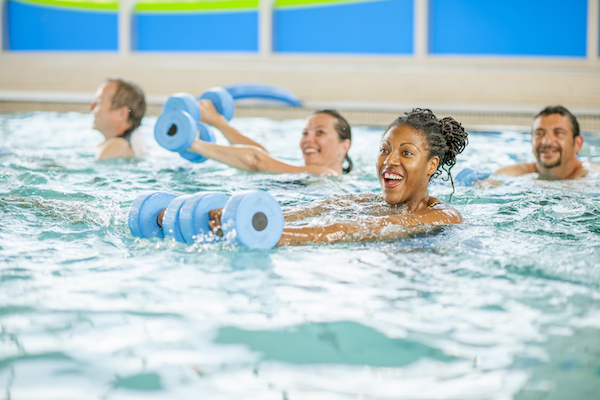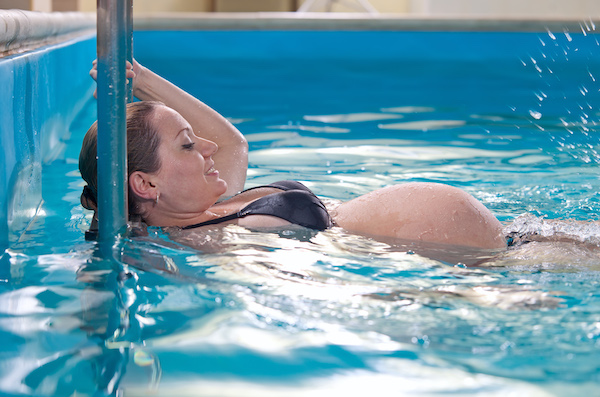Not only is swimming a beloved summertime activity, there are also tons of benefits of swimming.
Whether you head for the pool or open water, swimming offers a great full-body workout. It’s an effective way to get your weekly 150 minutes of moderate-intensity cardio, as recommended by the Centers for Disease Control and Prevention.
Here are seven reasons to incorporate swimming into your exercise routine.
1. It Can Help With Weight Loss
Thanks to the fact that swimming burns plenty of calories and involves all your major muscle groups, it can help you reach your weight loss goal.
Research shows that it may be more effective for weight loss than other popular cardio exercises, such as walking.
For example, a 2010 study published in Metabolism reveals that sedentary women who swam three times per week at a moderate intensity lost more weight than women who walked three times per week.
Swimmers also saw greater improvements in total cholesterol and low-density lipoprotein (LDL) cholesterol (commonly referred to as “bad” cholesterol).
What’s more, you may see noticeable improvements in just a few months.
In another study, middle-aged women who swam for 60 minutes three times per week decreased their body fat percentage by an average of nearly three percent in just 12 weeks. The swimming group also improved their cardiovascular endurance, flexibility, and blood lipids.
2. It Offers a Full-Body Strength Workout
“Swimming truly works your entire body,” says Lindsay Bechtold, a private swim coach. It challenges your shoulders, arms, back, abs, glutes, hamstrings — and even your ankles.
And unlike traditional strength training, where you pause between sets, swimming offers continuous resistance; so long as you’re in the water, you’re encountering resistance.
You can make things more or less challenging by changing your speed, performing different strokes, or using equipment like kick boards and hand paddles.
3. It Can Improve Your Cardio Endurance
As a form of cardio exercise, swimming strengthens your cardiorespiratory system (heart, lungs, and blood vessels).
In the same study described above, the women who swam for 60 minutes three times per week also saw great improvements in cardiovascular endurance by the end of the 12 weeks.
Why is this a notable benefit of swimming? The stronger your cardiorespiratory system, the better you’ll be able to sustain vigorous exercise over a period of time (also known as endurance).
The result: You can push yourself harder for longer in your workouts and in daily life.
4. It’s Low Impact
You don’t need to jump up and down or pound your feet into the ground to get a good cardio workout. Thanks to the buoyancy of the water, swimming offers a total body workout that’s also easy on your joints.
What’s more, swimming may even help reduce joint pain and stiffness.
One group of adults with osteoarthritis (a “wear and tear” joint condition) reported significant improvements in joint stiffness and pain after swimming 45 minutes three days a week for three months, according to a 2016 study.
As an added bonus, the swimmers also saw greater muscle strength by the end of the study.
5. It Can Help Improve Sleep
Research shows that regular aerobic exercise like swimming can even help you score better sleep.
In one study, older adults with chronic insomnia who performed moderate aerobic exercise (including swimming) four times per week for 16 weeks saw greater improvements in sleep quality, mood, and quality of life than a control group.
6. Good to Do During Pregnancy
While traditional forms of cardio like running, cycling, or even walking can be challenging and uncomfortable for pregnant women — especially during the later stages of pregnancy — swimming is generally safe and enjoyable.
“The buoyancy helps keep pressure off the lower back and stomach,” Bechtold says.
That said, every pregnancy is different. If you’re pregnant (or think you might be pregnant), check with your doctor to make sure exercise is safe for you.
7. It’s Affordable
In general, swimming is a fairly cheap and affordable activity. You only really need a swimsuit, like these active swimwear options, but you may choose to add accessories like swimming goggles, nose plugs, or a kick board.
Then, you just need a spot to swim. If you have a health club membership, see if they have a pool onsite.
If you don’t have a club membership, or you belong to a club that doesn’t have a pool, check out local community centers. Many community centers have a pool available for residents to use.
Just Start Swimming
Now that you know the benefits of swimming, it’s time to start capitalizing on them! If you already know how to swim, that’s great.
If you’re new to swimming or just need to brush up on your stroke, it’s probably worth it to take some swimming lessons or work one-on-one with a swim instructor.
Once you’re ready to add swimming to your fitness routine, try one of these swim workouts that will be sure to get you working hard.







